Kartoffelsalat is a must-have at many German holiday tables, especially during Easter brunches and … (More)
German Culture
Germany, a country in the heart of Europe, is renowned for its rich cultural heritage, shaped by centuries of history, diverse influences, and continuous innovation. This website covers almost all aspects of German culture, offering a glimpse into what makes it both unique and universally appealing.
German culture has been shaped by major historical events, including the Holy Roman Empire, the Reformation, the Enlightenment, industrialization, two World Wars, and reunification after the fall of the Berlin Wall in 1989. Each era left an indelible mark on German society, influencing its traditions, values, and global perception.
German, Germany’s official language, is known for its precision and depth. The country has a rich literary tradition, with figures like Johann Wolfgang von Goethe, Friedrich Schiller, and more contemporary authors like Günter Grass and Herta Müller. The Brothers Grimm’s fairy tales have captivated children worldwide, while their work in linguistics has had a lasting impact on the study of Germanic languages.
Germany’s contribution to the arts is monumental. In classical music, composers like Johann Sebastian Bach, Ludwig van Beethoven, and Richard Wagner have left a legacy that defines the genre. In visual arts, the German Renaissance, and later movements like Expressionism and Bauhaus, have influenced art globally.
From the Romanesque and Gothic churches to modernist Bauhaus buildings, German architecture displays a range of styles. The Neuschwanstein Castle in Bavaria is a prime example of 19th-century Romanticism, while the Berlin skyline showcases cutting-edge contemporary architecture.
German culture is rich in traditions and customs, many of which are celebrated through various festivals and events.
Oktoberfest
Oktoberfest in Munich is world-famous, drawing visitors from across the globe to celebrate Bavarian culture, beer, and food in a festive atmosphere. Traditional clothing like Lederhosen and Dirndl are often worn, showcasing regional folk costumes.
Christmas Markets
Germany’s Christmas markets (Weihnachtsmärkte) are magical, with their origins dating back to the Middle Ages. These markets, found in nearly every town, are filled with festive decorations, traditional crafts, and culinary delights like Glühwein and Lebkuchen.
The Carnival season, particularly strong in the Rhineland region, features parades, costumes, and balls. It’s a time when traditional roles are reversed, and revelers enjoy a sense of freedom and humor.
Cuisine
German cuisine is as diverse as its regions, known for its hearty and robust flavors. Dishes like Bratwurst, Sauerkraut, and Pretzels are globally recognized. Each region has its specialties, like the seafood dishes of the North, the apple wine of Hessen, or the Spätzle of the South.
Germany is famous for its beer, with a brewing tradition rooted in the Reinheitsgebot (Beer Purity Law) of 1516. The country boasts a variety of beer styles, including Pilsner, Weizenbier, and Kölsch. Additionally, Germany is renowned for its Riesling wines, produced in picturesque vineyards along rivers like the Rhine and Mosel.
This comprehensive website of German culture highlights its depth and diversity, offering a window into a nation that seamlessly blends tradition with modernity. Whether you’re a history buff, an art enthusiast, or a culinary explorer, Germany’s rich cultural tapestry has something to intrigue and inspire everyone.
Featured Story
Featured Stories

Exploring the Refreshing World of Schorle: A Traditional German Beverage
Schorle, a traditional beverage deeply rooted in German culture, combines the simplicity of sparkling water with the rich flavors of fruit juices or wine, offering a refreshing alternative to sugary soft drinks. This versatile and popular drink not only quenches thirst but also reflects an important aspect of German beverage culture. This article delves into […]
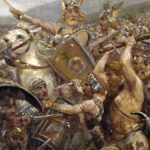
Unraveling the Mystery: The Battle of the Teutoburg Forest
The Battle of the Teutoburg Forest, a pivotal event in ancient history, marked a significant turning point in the Roman Empire’s expansionist ambitions. In 9 AD, an alliance of Germanic tribes, led by Arminius, a chieftain of the Cherusci tribe, ambushed and decimated three Roman legions commanded by Publius Quinctilius Varus. This battle, fought in […]

The Rich History of Sauerkraut in German Cuisine: A Culinary Journey
Sauerkraut, the tangy and iconic fermented cabbage dish, has been a staple in German cuisine for centuries. Its unique taste, health benefits, and storied history have cemented its status not only in Germany but also across the globe. This comprehensive exploration will unveil the origins, evolution, and enduring appeal of sauerkraut in the fabric of […]
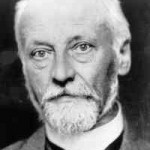
March 23 in German History
March 23, 1819 Assassination of August Kotzebue in Mannheim, Germany. Kotzebue was a dramatist who wrote over 200 plays. Among his plays are Spanier in Peru (1796), Der Wildfang (1798), and Die deutschen Kleinstädter (1803). In addition to his plays, Kotzebue was engaged in politics during his entire life which caused him much trouble. He […]

A Journey Through German Cuisine: A Feast of Tradition and Diversity
Germany, with its rich and diverse food traditions, has long been celebrated for its culinary prowess. Its regional specialities vary widely, reflecting the cultural influences, agricultural resources, and historical events that have shaped the nation. From hearty meat dishes and robust sausages to tangy sourdough bread and decadent cakes, German traditional food offers an incredible […]

German Wedding Tips
Here are some more wedding tips prompted by an American of German descent: Wedding Attire (Bride) – as in America, the bride usually wears white with one difference: the gowns usually do not have any trains, and if they do, they are very short, and just a little sweep. Most brides prefer the good old […]

Eco-Friendly Initiatives on the Autobahn
The Autobahn is not only a symbol of German engineering prowess but also a leader in environmental stewardship within the infrastructure sector. This article delves into the various eco-friendly initiatives integrated into the Autobahn system, demonstrating Germany’s commitment to sustainable development. Sustainable Construction Practices: Wildlife Conservation Efforts: Energy Efficiency and Renewable Energy: Water Management and […]
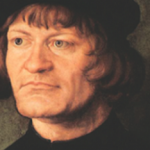
October 11 in German History
October 11, 1491 Death of Blessed Jakob Griesinger. Little is known of Jakob Griesinger, also known as Jakob von Ulm and as Alemannus. He was born in Ulm, Germany in 1407 and trained as a glass blower. He undertook a trip to the holy sites in Rome and on the return trip stooped to pray […]

Georg Wilhelm Friedrich Hegel: Philosophy and Influence
Georg Wilhelm Friedrich Hegel (1770–1831) was a German philosopher who profoundly influenced Western thought. His work traversed a wide range of subjects, including philosophy, history, politics, and society. Hegel is best known for his development of dialectical reasoning and absolute idealism, which have had a lasting impact on various intellectual domains. This article provides an […]
Read More

March 14 in German History
March 14, 968 Death of St. Mathilda (ca. 895 - 968). St. Matilda, the wife of the German king Heinrich I was born in about 895 in Engern, Saxony, Germany. Matilda and King Heinrich married in 909. … [Read More...]

Döppekuchen – Rheinland Potato Flan
Döppekooche/Döbbekooche is a form of potato cake made of grated potatoes, finely minced onions, eggs and spices and cover in sausage pieces or strips of bacon, which is baked in a cast-iron pot (a … [Read More...]

Nazi and Bauhaus School
The end of Bauhaus The Nazi majority of Dessau suspended the seat of learning. Paul Schultze-Naumburg was the architect that they sent into the school to re-establish pure German art instead of the … [Read More...]
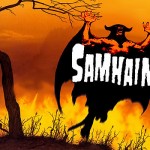
Halloween’s Origins and Traditions of Celebration in Germany
Halloween is when all demons and witches are out for the night hunting, and when there are pumpkins glaring out of the windows, and when it's better to give a treat instead of being … [Read More...]
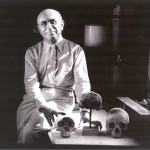
June 7 in German History
June 7, 1826 Death of Joseph von Fraunhofer in Munich, Germany. The physicist, Fraunhofer was the first to observe the dark lines in the spectrum of the sun, which became known as Fraunhofer lines. … [Read More...]

Swabian Pancakes
Swabian Pancakes, also known as "Schwäbische Pfannkuchen," are a delightful dish hailing from the Swabian region of Southern Germany. This versatile and delicious recipe is perfect for both savory and … [Read More...]
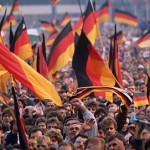
Real Germans’ habits
What are Real Germans like? Set all stereotypes aside and read about Real Germans' habits, likes and dislikes. By guest author WEISSDORN Real Germans want everything at least 99.999999%. That is to … [Read More...]

Getting Married in Germany (legal issues)
If a couple plans to get married in Germany, it is recommended to start with the legal formalities as soon as possible (for example, in some regions - 6 months early), because a number of legal … [Read More...]

Ludwig Erhard and the Grand Coalition
Konrad Adenauer assumed the chancellorship of the newly founded FRG in 1949, at the age of seventy-three. From the beginning, his primary foreign policy goals had been the achievement of German … [Read More...]
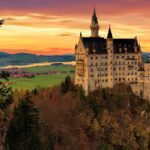
The History of German Castles: From Medieval Fortresses to Fairytale Palaces
Germany is home to some of the most breathtaking castles in the world, each one steeped in history, myth, and grandeur. From the imposing medieval fortresses that once housed knights and lords to the … [Read More...]
